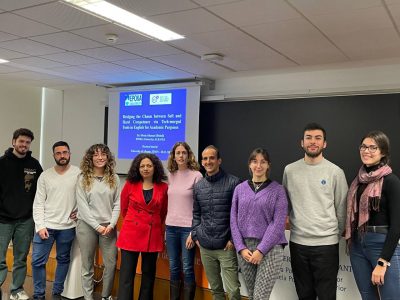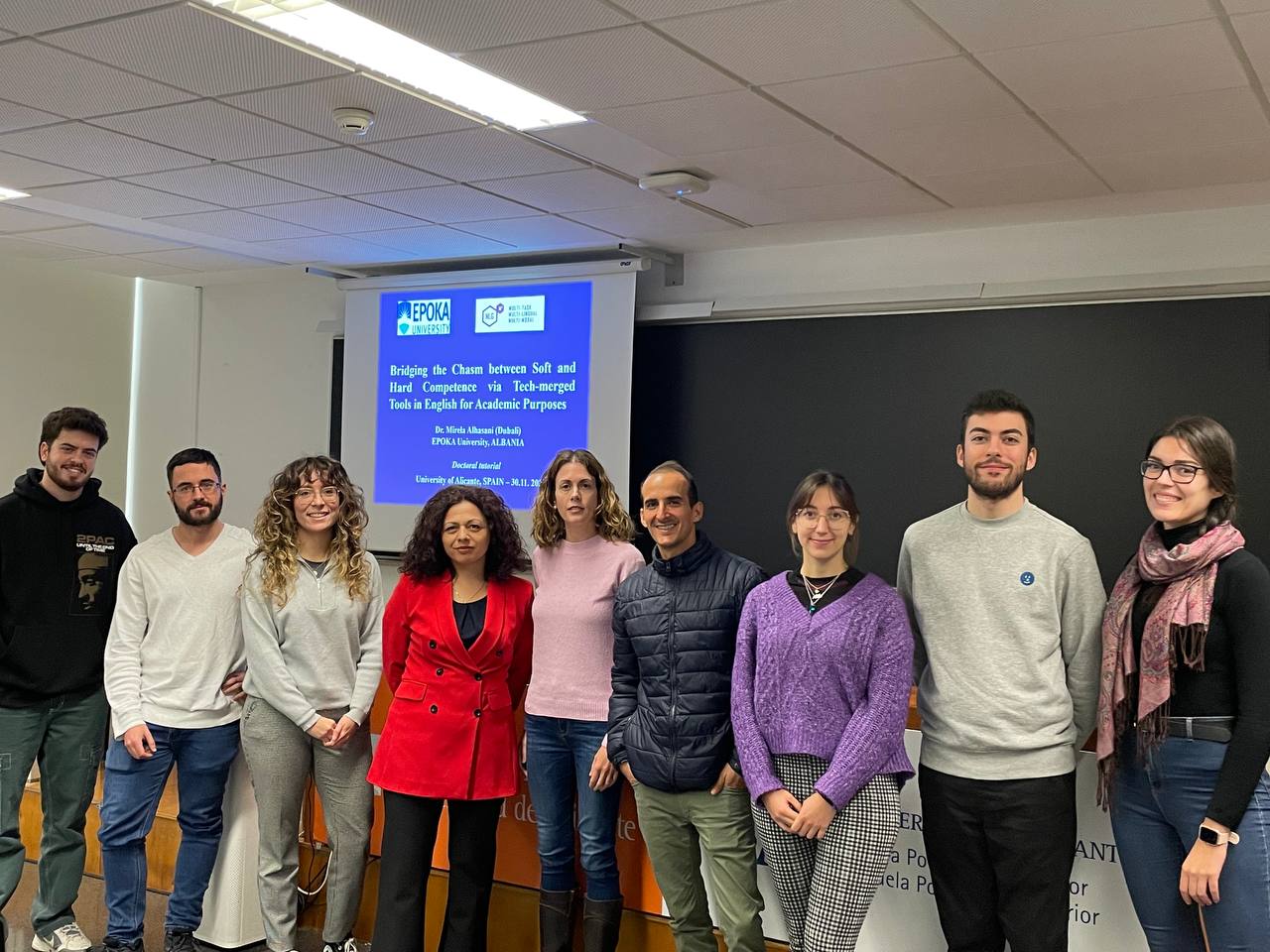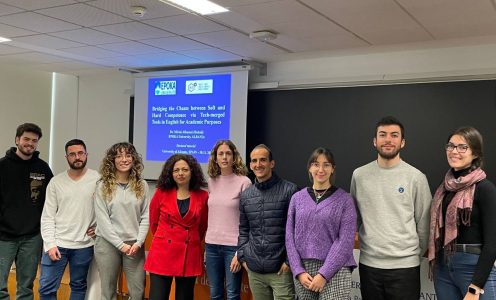Country: Spain
Trained in text immersion and text summarization.
Doctoral presentations:
- Fostering Multidisciplinary Collaboration through Multi3Generation
- Bridging the Chasm between Soft and Hard Competence via Tech-merged Tools in English for Academic Purposes
Dr. Mirela Alhasani (Dubali)
Presentation to doctoral students on the need for soft competence for engineering students
Fostering Multidisciplinary Collaboration through Multi3Generation
English for Academic Reading and Writing is a mandatory course taken by the three faculties at EPOKA University in Tirana, Albania. It aims to equip students with the independent, analytical, and evaluative skills to read sophisticated scientific literature in the genre, and to construct their scientific output be it a research paper or master/doctoral thesis. This EAP course is built upon an assessment analysis of students’ needs per each domain of study. This presentation will shed light on such needs as manifested by two original types of research conducted with undergraduate students of the Faculty of Architecture and Engineering published in Scopus/ Web of Science Journal (https://doi.org/10.22190/JTESAP2101109A) and with the graduate students of economics, business and political science programs at EPOKA University taught by the author Dr. Mirela Alhasani during Covid-19 pandemic published Routledge (https://www.taylorfrancis.com/chapters/edit/10.4324/9781003283409–13/measuring–graduatestudents–perceptions–academic–english–reading–writing–course–turbulent–times–case–study–albania–mirela–alhasanidubali). The first study aimed at examining students’ perceptions of the role of linguistic competencies gained via Academic and Specific English courses in the engineering curricula. This was the first investigation to measure the perception of engineering students regarding the contribution of specific English courses to their professional linguistic communication as students and practitioners. A survey was conducted via a google form as a tool to collect data during the pandemic months of Corvid -19, inviting 300 undergraduate students with 231 students of them accepting to participate in the survey. Students were mainly from the computer engineering department (150) the largest one of the faculty, and the second group from Architecture (58) to be followed by Civil engineering and Electronics programs with the least number of enrolled freshmen at the faculty level. Students were all freshmen of age 18-20 and therefore, to have their independent feedback on the impact of language courses on their academic and professional perspectives was a novelty at an applied science faculty since, traditionally, students devote many years of advanced preparation to hard sciences like mathematics and physics; apparently, the foreign language course program had never been given any attribute for further career prospects.
Predominantly, all variables examined in the survey showed high appreciation and positive feedback from students about the beneficial influence of the ESP courses on their communicative competence and domain-tailored knowledge. The findings exhibit positive reactions concerning the necessity to have ESP courses rather than general English courses for further academic and career opportunities. Moreover, those students who had been involved in international experiences were testimonies of the benefits that the English engineering vocabulary taught in the class had been very useful to them in daily practice and professional engagement. The most essential finding of the study is that students themselves did admit that language courses have a status of importance to them equal to other curricula courses thus, restoring the worthy position of ESP in their squeezed curricula. This pilot research with its motivating findings triggers further systematic diagnostic measurement of the linguistic needs and course content of ESP university programs in Albania and the region for more effective language competence for engineering students.
Bridging the Chasm between Soft and Hard Competence via Tech-merged Tools in English for Academic Purposes
The second research examined the need for hard-digital competence of graduate students from the other two faculties Economics/Business Administration and Social sciences during the pandemic online teaching of the Advanced Academic Writing course. Similarly, a survey was conducted to collect unbiased feedback from 94 master’s students taking the mandatory Academic writing course prior to master thesis writing. The survey utilized a standardized Cambridge University questionnaire with 24 questions closed and open ones offering suggestions on achievements or/and challenges to tech-merged self-regulatory learning styles at home settings during Covid-19 worldwide. Students overall evaluated the course input and output as a success story given the unpreparedness for such an utter reliance on technology. However, unlike other western peers, the Albanian students predominantly were sceptical and totally against any other scenario of substitution of conventional on-campus teaching and online learning. They cited strongly and clearly their firm preference solely for on-campus teaching and learning since self-handling of tech devices was very difficult for them. There was an enormous need to improve digital competence to proper usage of language software or langue inter-dialogue via computer programs. These disappointing findings by young modern learners in a most modernized smart campus like EPOKA University, cause rapid action by academic staff. The future seems unpredictable with many types of threats pressuring us to switch to online tech-merged education. Therefore, it turns an evitable co-joint collaboration between philologists and language instructors and computer engineering/science scholars to come out with student-friendly language programs where the two sides can benefit; the engineering students can and need to improve their linguistic eloquence and overall communication; meanwhile, the social science track needs to be more exposed and trained in language technology programs to properly use it to accomplish written records.


